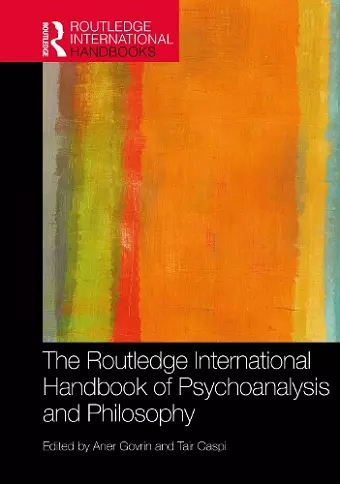The Routledge International Handbook of Psychoanalysis and Philosophy
Aner Govrin editor Tair Caspi editor
Format:Hardback
Publisher:Taylor & Francis Ltd
Published:25th Nov '22
Currently unavailable, and unfortunately no date known when it will be back

The Routledge International Handbook of Psychoanalysis and Philosophy provides a rich panoramic view of what philosophy offers or disturbs in psychoanalysis and what it represents for psychoanalytic theory and practice. The thirty-three chapters present a broad range of interfaces and reciprocities between various aspects of psychoanalysis and philosophy. It demonstrates the vital connection between the two disciplines: psychoanalysis cannot make any practical sense if it is not entirely perceived within a philosophical context.
Written by a team of world-leading experts, including established scholars, psychoanalysts and emerging talents, the Handbook investigates and discusses the psychoanalytic schools and their philosophical underpinning, as well as contemporary applied topics. Organized into five sections, this volume investigates and discusses how psychoanalysis stands in relation to leading philosophies such as Wittgenstein, Heidegger, Nietzsche, and Kant; philosophical perspectives on psychoanalytic schools such as Freud, Klein, Bion, Kohut, and Lacan; how psychoanalysis addresses controversial topics in philosophy such as truth, language and symbolism, ethics, and theories of mind. The last section addresses contemporary applied subjects in psychoanalytic thought: colonialism, gender, race, and ecology.
This Handbook offers a novel and comprehensive outlook vital for scholars, philosophers, practicing psychoanalysts and therapists alike. The book will serve as a source for courses in psychoanalysis, philosophy of science, epistemology, ethics, semiotics, cognitive science, consciousness, gender, race, post-colonialism theories, clinical theory, Freud's studies, both in universities and psychoanalytic training programs and institutes.
'From its very beginnings, psychoanalysis has had an uneasy, even mistrustful, relationship to philosophy. Recognizing that they are interested in many overlapping issues, practitioners of both disciplines are dubious of both the methods and the conclusions of the other; the result is that opportunities for cross-fertilization are easily overlooked. In this Handbook, Aner Govrin and Tair Caspi create a conversation that aims to capitalize on the potential for mutual enrichment that is possible when psychoanalysts and philosophers carefully and respectfully address shared concerns. The editors have assembled a distinguished group of authors; some are psychoanalysts, some philosophers, and many are both. The result is a collection that is sure to engage and inform readers interested in deepening their understanding of some of the most foundational themes of both psychoanalysis and philosophy.'
Jay Greenberg, Ph.D., Training and Supervising Analyst, William Alanson White Institute, USA. Former Editor of The Psychoanalytic Quarterly and recipient of the Mary S. Sigourney Award for Outstanding Achievement in Psychoanalysis, 2015.
'Freud always thought that psychoanalysis would take over from the philosophy of mind and make it redundant. He seems to have been wrong because Aner Govrin and Tair Caspi, the editors, have collected a significant team of contemporary philosophers from around the world who are still investigating just how the two disciplines compare, contrast, discount each other or can collaborate together. So, what has psychoanalysis done with philosophy and for philosophy, they ask; and also philosophy for psychoanalysis.
There is a landmark quality about this extensive compendium of these two overlapping and penetrating disciplines. These thirty-three Chapters pick out the interacting schools – both philosophical and psychoanalytic – and the multiple philosophical influences on our confusing dispersion of the psychoanalytic schools. This wide-ranging gathering of knowledgeable philosophers and psychoanalysts will tell us, and if they don’t, then they give us much to think about for ourselves. It is for reference, frequent reference.'
Bob Hinshelwood, Professor Emeritus, University of Essex, UK
'Panoramic in scope and scholarly in execution, the Handbook edited by Aner Govrin and Tair Caspi brings together contributions from some of today’s leading thinkers across both disciplines, including philosophically-engaged practising psychoanalysts, to present a stimulating overview of contemporary developments. What struck me most about this collection is the multiple ways in which the essays variously bring the old and the established into innovative dialogue with the new and the forward-looking. Traditional giants of philosophy and enduring philosophical themes are here cross-fertilized with traditional giants of post-Freudian and enduring psychoanalytic issues. What emerges is a series of fresh perspectives on important topics on the interface of both disciplines some of these perspectives unfolding in the light of contemporary movements and concerns. There are some real gems amongst these contributions, and I expect that different readers will be rewarded by finding their own different favourites.
I recommend this handbook as a valuable and thought-provoking collection giving a timely snapshot of forward-looking twenty-first-century thinking about the interface between psychoanalysis and philosophy. In my view it will stand the test of time as a significant contribution to demonstrating that psychoanalysis and philosophy simply cannot do without each other.'
Agnes Petocz, PhD, Senior Lecturer, Western Sydney University, Australia. Author of Freud, Psychoanalysis and Symbolism (CUP, 1999)
ISBN: 9780367276454
Dimensions: unknown
Weight: 1280g
556 pages